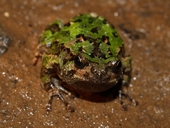|
Description
M 32-36 mm, F 35-44 mm. Tympanum indistinct but typically visible. Tibiotarsal articulation reaches at the most between insertion of forelimb and tympanum. Tips of fingers and toes strongly enlarged. Skin relatively smooth with a number of large granules. Typically there are two symmetrical pairs of larger tubercles, a pair of elongated tubercles in the shoulder region and one of smaller tubercles on the posterior back. Dorsally green with symmetrical darker markings. Ventral pattern often with contrasted dark-white marbling, the dark colour extending onto the posterior belly (Glaw and Vences 2007).
Similar species: Morphologically closest to S. menabensis which, however, is distributed in western Madagascar. S. spinosa is larger and has tubercles of more spiny appearance, especially above forelimb insertion. S. boribory is much larger, lacks the two pairs of symmetrical tubercles on the dorsum and often has reddish colour on the terminal discs of fingers and toes (Glaw and Vences 2007).
Distribution and Habitat
Country distribution from AmphibiaWeb's database: Madagascar
Located in Ampahanana forest (near Fierenana), Andasibe, Zahamena (Volotsangana river) (Glaw and Vences 2007) at 100-1000 m asl (Vences and Glaw 2008).Life History, Abundance, Activity, and Special Behaviors
Habits: Largely unknown. Tadpoles probably belonging to this species have recently been found in large temporary pools in rainforest at the edge of Analamazoatra Reserve. At Andasibe, especially close to Analamazoatra Reserve entrance, single specimens, especially juveniles, can often be observed moving on the ground at night. Since reproduction has almost never been observed despite intensive fieldwork by many researchers around Andasibe, it is likely that this species, as other Scaphiophryne, is a very explosive breeder that reproduces only once per rainy season after the first heavy rains (Glaw and Vences 2007).
Trends and Threats
This species is listed as vulnerable because its extent of occurrence is less than 20,000 km2, its distribution is severely fragmented, and there is continuing decline in the extent and quality of its forest habitat in eastern Madagascar. It does not survive in very open areas. Its forest habitat is receding due to subsistence agriculture (including livestock grazing), timber extraction, charcoal manufacture, the spread of invasive eucalyptus, fire, and expanding human settlements. The bright colouration of this species might make it more attractive for commercial collecting in the future. There are currently small numbers in the pet trade, but probably not at a level to have a negative impact on the species. It occurs in the R�serve Sp�ciale d�Analamazaotra, Parc National de Mantadia and Parc National de Zahamena (Vences and Glaw 2008). Possible reasons for amphibian decline General habitat alteration and loss
Habitat modification from deforestation, or logging related activities
Intensified agriculture or grazing
Urbanization
Intentional mortality (over-harvesting, pet trade or collecting)
Comments
Taken with permission from Glaw and Vences (2007).
References
Glaw, F., and Vences, M. (2007). Field Guide to the Amphibians and Reptiles of Madagascar. Third Edition. Vences and Glaw Verlag, Köln.
Vences, M. and Glaw, F. (2008). Scaphiophryne marmorata. In: IUCN 2008. 2008 IUCN Red List of Threatened Species. www.iucnredlist.org. Downloaded on 08 April 2009.
Originally submitted by: Miguel Vences and Frank Glaw (first posted 2001-10-19)
Edited by: Catherine Aguilar (2017-01-19)Species Account Citation: AmphibiaWeb 2017 Scaphiophryne marmorata <https://amphibiaweb.org/species/2076> University of California, Berkeley, CA, USA. Accessed Jun 5, 2025.
Feedback or comments about this page.
Citation: AmphibiaWeb. 2025. <https://amphibiaweb.org> University of California, Berkeley, CA, USA. Accessed 5 Jun 2025.
AmphibiaWeb's policy on data use.
|





 Map of Life
Map of Life